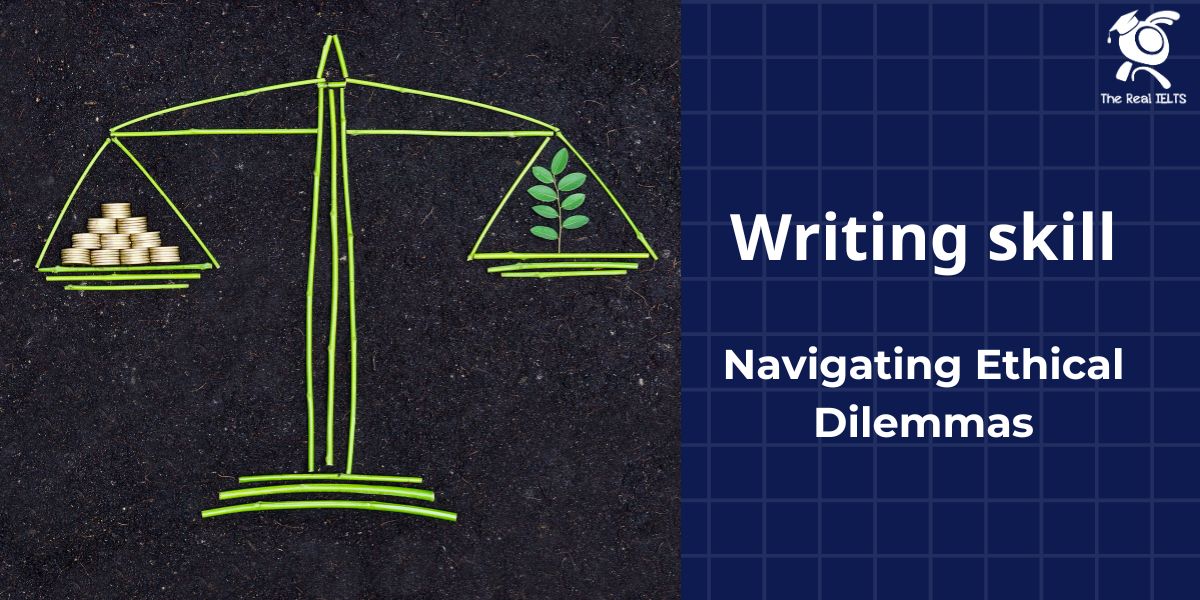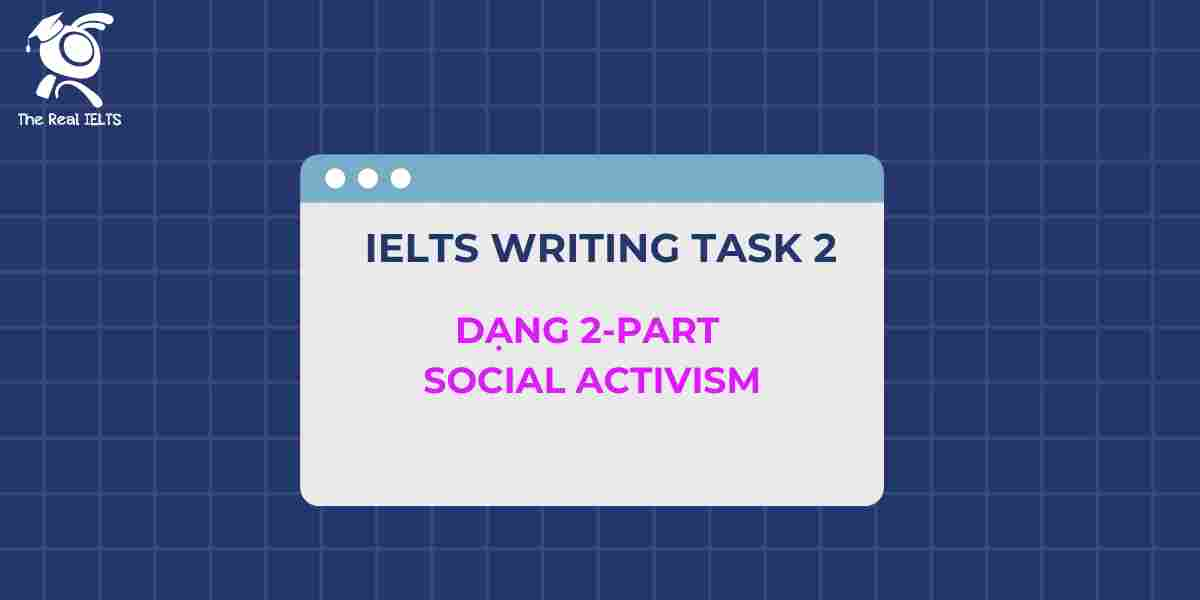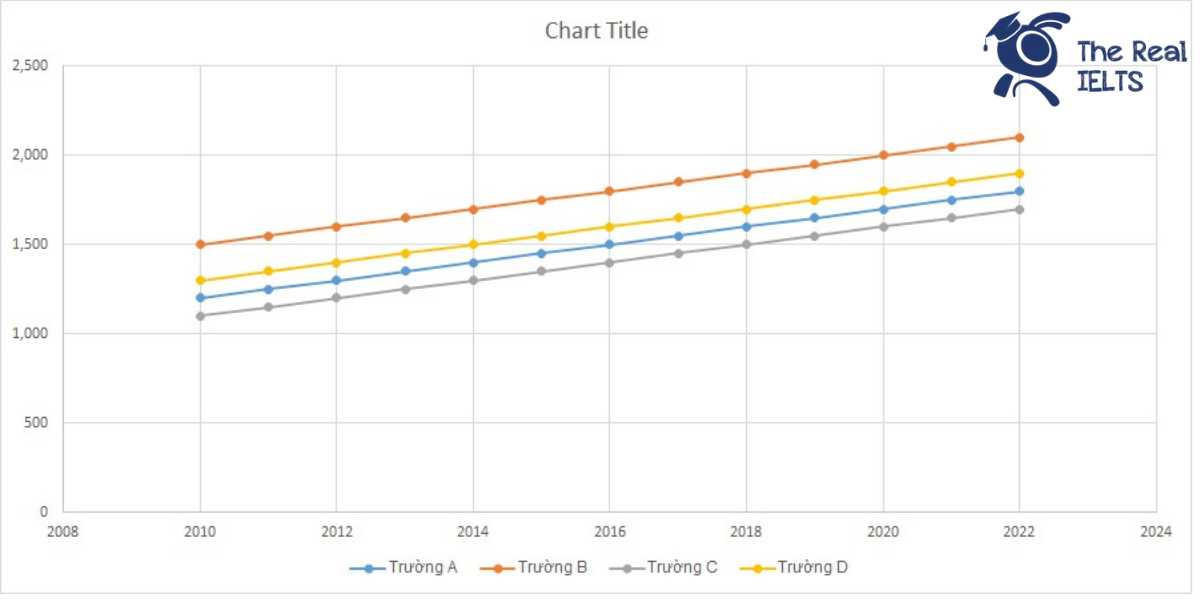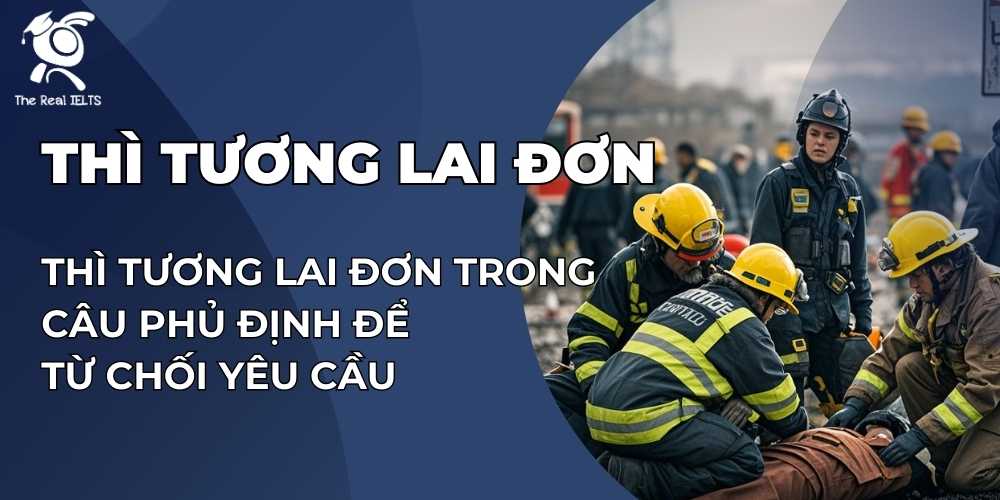Chủ đề về đạo đức (Ethical) ứng xử là một chủ đề rất trừu tượng và cũng là một chủ đề rất khó nếu chẳng may bạn học viên nào thi phải đề này. Tuy nhiên khó không có nghĩa là không làm được, chủ đề này sẽ được làm ví dụ trong bài này.
Từ vựng và cụm từ vựng cần nắm được
- Ethical dilemmas – /ˈɛθɪkəl dɪˈlɛməz/ – tình huống đạo đức
- Professional environments – /prəˈfɛʃənl ɪnˈvaɪrənmənts/ – môi trường chuyên nghiệp
- Conflicting moral obligations – /kənˈflɪktɪŋ ˈmɔrəl ˌɒblɪˈɡeɪʃənz/ – những nghĩa vụ đạo đức mâu thuẫn
- Ambiguous ethical implications – /æmˈbɪɡjuəs ˈɛθɪkəl ˌɪmplɪˈkeɪʃənz/ – những hàm ý đạo đức mơ hồ
- Maintaining integrity – /meɪnˈteɪnɪŋ ɪnˈtɛɡrəti/ – duy trì tính chính trực
- Trust and reputation – /trʌst ænd ˌrɛpjʊˈteɪʃən/ – niềm tin và uy tín
- Ethical decision-making – /ˈɛθɪkəl dɪˈʒɪʒnˈmeɪkɪŋ/ – quyết định đạo đức
- Conflicts of interest – /ˈkɒnflɪkts əv ˈɪntrɪst/ – xung đột lợi ích
- Issues of confidentiality – /ˈɪʃuːz əv kɒnfɪˌdɛnʃiˈælɪti/ – vấn đề bảo mật thông tin
- Potential harm to stakeholders – /pəˈtɛnʃəl hɑːm tʊ ˈsteɪkhoʊldərz/ – nguy cơ gây hại cho các bên liên quan
- Organizational policies – /ˌɔːɡənaɪˈzeɪʃənl ˈpɒləsiz/ – chính sách tổ chức
- Pressure to achieve goals – /ˈprɛʃər tuː əˈtʃiːv ɡoʊlz/ – áp lực để đạt được mục tiêu
- Clear values and codes of conduct – /klɪr ˈvæljuːz ænd koʊdz ʌv ˈkɒndʌkt/ – các giá trị và quy tắc ứng xử rõ ràng
- Ethical leadership – /ˈɛθɪkəl ˈliːdərʃɪp/ – lãnh đạo đạo đức
- Open communication – /ˈoʊpən kəˌmjuːnɪˈkeɪʃən/ – giao tiếp mở
- Transparency and accountability – /trænˈspɛrənsi ænd əˌkaʊntəˈbɪləti/ – minh bạch và trách nhiệm
- Ethical training and education – /ˈɛθɪkəl ˈtreɪnɪŋ ænd ˌɛdʒəˈkeɪʃən/ – đào tạo và giáo dục đạo đức
- Guidance and support – /ˈɡaɪdns ænd səˈpɔːrt/ – hướng dẫn và hỗ trợ
- Real-life examples – /rɪəl-laɪf ɪɡˈzæmpəlz/ – ví dụ thực tế
- Corporate social responsibility – /ˈkɔːpərɪt ˈsoʊʃəl rɪˌspɒnsəˈbɪləti/ – trách nhiệm xã hội doanh nghiệp
Dàn ý triển khai bài Writing về Ethical
I. Introduction
A. Definition of ethical dilemmas in professional settings
B. Importance of addressing ethical issues in the workplace
C. Thesis statement: Exploring strategies for effectively navigating ethical dilemmas in professional environments.
II. Understanding Ethical Dilemmas
A. Definition of ethical dilemmas
B. Common types of ethical dilemmas in professional settings
C. Factors contributing to ethical dilemmas (e.g., conflicting interests, ambiguous policies)
III. Importance of Ethical Decision Making
A. Impact of ethical decision-making on individuals and organizations
B. Consequences of unethical behavior in the workplace
C. Building trust and reputation through ethical conduct
IV. Strategies for Navigating Ethical Dilemmas
A. Establishing a strong ethical framework
- Company values and codes of conduct
- Ethical leadership
B. Promoting open communication - Encouraging employees to voice concerns
- Creating channels for reporting unethical behavior
C. Conducting ethical training and education - Providing employees with the tools to recognize and address ethical dilemmas
- Case studies and role-playing exercises
D. Seeking guidance and support - Consulting mentors, colleagues, or supervisors
- Utilizing resources such as ethics committees or ombudspersons
V. Case Studies and Examples
A. Real-life examples of ethical dilemmas in various professional fields
B. Analysis of how different strategies were employed to resolve these dilemmas
C. Lessons learned and best practices for future situations
VI. Conclusion
A. Recap of the importance of ethical decision-making in professional environments
B. Summary of key strategies for navigating ethical dilemmas
C. Call to action for individuals and organizations to prioritize ethical conduct in the workplace.
Bài viết triển khai
Navigating Ethical Dilemmas in Professional Environments
In today’s complex and interconnected world, professionals often find themselves grappling with ethical dilemmas in their workplaces. These dilemmas arise when individuals are faced with conflicting moral obligations or when their actions may have ambiguous ethical implications. Effectively navigating these ethical challenges is essential for maintaining integrity, trust, and reputation in professional environments. This essay explores strategies for addressing ethical dilemmas in the workplace and emphasizes the importance of ethical decision-making.
Understanding Ethical Dilemmas
Ethical dilemmas in professional settings occur when individuals encounter situations where there is a conflict between competing moral principles or when the right course of action is unclear. These dilemmas can manifest in various forms, such as conflicts of interest, issues of confidentiality, or decisions involving potential harm to stakeholders. Factors contributing to ethical dilemmas may include ambiguous organizational policies, pressure to achieve goals, or conflicting personal values.
Importance of Ethical Decision Making
Ethical decision-making is paramount in professional environments as it influences not only individual actions but also organizational culture and reputation. When individuals prioritize ethical considerations in their decision-making processes, they contribute to the creation of a positive work environment built on trust and integrity. Conversely, unethical behavior can lead to legal repercussions, damage to relationships with stakeholders, and tarnished reputations.
Strategies for Navigating Ethical Dilemmas
To effectively navigate ethical dilemmas, professionals can employ various strategies:
Establishing a strong ethical framework: Organizations should articulate clear values and codes of conduct that guide employees’ behavior. Ethical leadership plays a crucial role in setting the tone for ethical decision-making throughout the organization.
Promoting open communication: Encouraging employees to voice their concerns and providing channels for reporting unethical behavior fosters transparency and accountability.
Conducting ethical training and education: Equipping employees with the knowledge and skills to recognize and address ethical dilemmas through training programs, case studies, and role-playing exercises enhances ethical awareness and decision-making capabilities.
Seeking guidance and support: Consulting mentors, colleagues, or supervisors, and utilizing resources such as ethics committees or ombudspersons can provide valuable guidance and support when facing ethical challenges.
Case Studies and Examples
Real-life examples illustrate the application of these strategies in navigating ethical dilemmas across various professional fields. For instance, healthcare professionals often encounter dilemmas related to patient confidentiality and treatment decisions, while business executives may grapple with conflicts of interest and corporate social responsibility issues. Analyzing how individuals and organizations address these dilemmas can provide insights into effective strategies and best practices.
Conclusion
In conclusion, navigating ethical dilemmas in professional environments requires a multifaceted approach that includes establishing a strong ethical framework, promoting open communication, conducting ethical training, and seeking guidance and support. By prioritizing ethical decision-making, individuals and organizations can uphold integrity, earn trust, and contribute to a culture of ethics and responsibility in the workplace.
Cấu trúc ngữ pháp được sử dụng để Writing
- Cấu trúc ngữ pháp:
- Động từ:
- V-ing: “grappling with ethical dilemmas”, “maintaining integrity”, “navigating ethical challenges”, etc.
- V-ing sau “to”: “to recognize and address ethical dilemmas”
- V-ing làm danh từ: “establishing a strong ethical framework”, “promoting open communication”, etc.
- V-ing làm tính từ: “ethical decision-making”, “ethical training and education”, etc.
- Tính từ và cụm tính từ:
- Tính từ mô tả: “complex and interconnected world”, “ambiguous ethical implications”, etc.
- Cụm tính từ: “clear values and codes of conduct”, “ethical training and education”, etc.
- Danh từ và cụm danh từ:
- Danh từ chính và danh từ phụ: “ethical dilemmas”, “professional environments”, “conflicting moral obligations”, etc.
- Cụm danh từ: “issues of confidentiality”, “potential harm to stakeholders”, etc.
- Trạng từ:
- Trạng từ chỉ thời gian: “today’s complex and interconnected world”, etc.
- Trạng từ chỉ cách thức: “effectively navigating”, “clearly values”, etc.
- Liên từ:
- Liên từ kết hợp câu: “when individuals are faced with conflicting moral obligations”, “while business executives may grapple with conflicts of interest”, etc.
- Động từ:
- Cấu trúc câu:
- Câu đơn: “Ethical dilemmas arise when individuals are faced with conflicting moral obligations.”
- Câu phức: “Real-life examples illustrate the application of these strategies in navigating ethical dilemmas across various professional fields.”
- Câu kép: “Conversely, unethical behavior can lead to legal repercussions, damage to relationships with stakeholders, and tarnished reputations.”
- Câu điều kiện: “If individuals prioritize ethical considerations in their decision-making processes, they contribute to the creation of a positive work environment.”
Đọc lại bài viết Writing cũ: Writing skill part 9: The Power of Collaboration: Teamwork in Achieving Goals.















